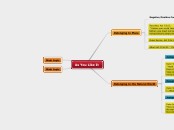As You Like It
Belonging to Place
Negative/Positive Connotations
Rosalind, Act I Sc II:
“Unless you could teach me to forget a banished father, you must not learn me how to remember any extraordinary pleasure”
Duke Senior, Act II Sc I: “ the envious court”
Adam Act II Sc III: “ this house is but a butchery
Belonging to the Natural World
Juxtaposition through Rhetorical Question
Duke Senior, Act II Sc I:
“Hath not old custom made this life more sweet than that of painted pomp?” AND/OR
“Are not these woods more free from peril than the envious court?”
Metaphor
Duke Senior, Act V Sc IV:
“…returnèd fortune”
Juxtaposition through verse
Duke Senior’s Men, Act II, Sc V:
“Here shall he see
No enemy
But winter and rough weather”
